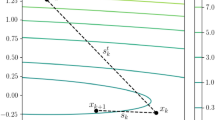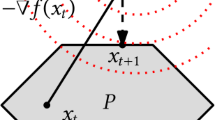Abstract
Randomized algorithms provide a powerful tool for scientific computing. Compared with standard deterministic algorithms, randomized algorithms are often faster and robust. The main purpose of this paper is to design adaptive randomized algorithms for computing the approximate tensor decompositions. We give an adaptive randomized algorithm for the computation of a low multilinear rank approximation of the tensors with unknown multilinear rank and analyze its probabilistic error bound under certain assumptions. Finally, we design an adaptive randomized algorithm for computing the tensor train approximations of the tensors. Based on the bounds about the singular values of sub-Gaussian matrices with independent columns or independent rows, we analyze these randomized algorithms. We illustrate our adaptive randomized algorithms via several numerical examples.
Similar content being viewed by others
References
Bader, B.W., Kolda, T.G., et al.: Matlab tensor toolbox version 3.0-dev. Available online. https://www.tensortoolbox.org (2017)
Ballani, J., Grasedyck, L., Kluge, M.: Black box approximation of tensors in Hierarchical Tucker format. Linear Algebra Appl. 438, 639–657 (2013)
Beylkin, G., Mohlenkamp, M.J.: Algorithms for numerical analysis in high dimensions. SIAM J. Sci. Comput. 26, 2133–2159 (2005)
Caiafa, C.F., Cichocki, A.: Generalizing the column-row matrix decomposition to multi-way arrays. Linear Algebra Appl. 433, 557–573 (2010)
Chan, T.F.: Rank revealing Q R factorizations. Linear Algebra Appl. 88/89, 67–82 (1987)
Che, M., Cichocki, A., Wei, Y.: Neural networks for computing best rank-one approximations of tensors and its applications. Neurocomputing 267, 124–133 (2017)
Cichocki, A.: Tensor networks for big data analytics and large-scale optimization problems, arXiv:1407.3124 (2014)
Cichocki, A., Zdunek, R., Phan, A.H., Amari, S.-I.: Nonnegative Matrix and Tensor Factorizations: Applications to Exploratory Multi-way Data Analysis and Blind Source Separation. Wiley, New York (2009)
Comon, P.: Tensor decompositions: state of the art and applications, in Mathematics in signal processing, V (Coventry, 2000), vol. 71 of Inst. Math. Appl. Conf. Ser. New Ser., pp. 1–24. Oxford University Press, Oxford (2002)
De Lathauwer, L., De Moor, B., Vandewalle, J.: A multilinear singular value decomposition. SIAM J. Matrix Anal. Appl. 21, 1253–1278 (2000)
De Lathauwer, L.: On the best rank-1 and rank-(r 1,r 2,? ,r n) approximation of higher-order tensors. SIAM J. Matrix Anal. Appl. 21, 1324–1342 (2000)
Dolgov, S., Khoromskij, B.N., Oseledets, I.V., Savostyanov, D.V.: Computation of extreme eigenvalues in higher dimensions using block tensor train format. Comput. Phys. Commun. 185, 1207–1216 (2014)
Drineas, P., Mahoney, M.W.: A randomized algorithm for a tensor-based generalization of the singular value decomposition. Linear Algebra Appl. 420, 553–571 (2007)
Eldén, L., Savas, B.: A Newton-Grassmann method for computing the best multilinear rank-(r 1,r 2,r 3) approximation of a tensor. SIAM J. Matrix Anal. Appl. 31, 248–271 (2009)
Friedlander, M.P., Hatz, K.: Computing non-negative tensor factorizations. Optim. Methods Softw. 23, 631–647 (2008)
Golub, G.H., Van Loan, C.F.: Matrix Computations, 4th adn. Johns Hopkins University Press, Baltimore (2013)
Goreinov, S.A., Oseledets, I.V., savostyanov, D.V.: Wedderburn rank reduction and Krylov subspace method for tensor approximation. Part 1: Tucker case. SIAM J. Sci. Comput. 34, A1–A27 (2012)
Goreinov, S.A., Tyrtyshnikov, E.E.: The maximal-volume concept in approximation by low-rank matrices, Structured Matrices in Mathematics Computer Science and Engineering I, pp. 47–51 (2001)
Grasedyck, L.: Hierarchical singular value decomposition of tensors. SIAM J. Matrix Anal. Appl. 31, 2029–2054 (2010)
Grasedyck, L., Kressner, D., Tobler, C.: A literature survey of low-rank tensor approximation techniques. GAMM-Mitt. 36, 53–78 (2013)
Hackbusch, W., Kühn, S.: A new scheme for the tensor representation. J. Fourier Anal. Appl. 15, 706–722 (2009)
Halko, N., Martinsson, P.G., Tropp, J.A.: Finding structure with randomness: probabilistic algorithms for constructing approximate matrix decompositions. SIAM Rev. 53, 217–288 (2011)
Hansen, P.C.: Regularization Tools version 4.0 for Matlab 7.3. Numer. Algorithms 46, 189–194 (2007)
Holtz, S., Rohwedder, T., Schneider, R.: The alternating linear scheme for tensor optimization in the tensor train format. SIAM J. Sci. Comput. 34, A683–A713 (2012)
Holtz, S.: On manifolds of tensors of fixed TT-rank. Numer. Math. 120, 701–731 (2012)
Ishteva, M., Absil, P.-A., Van Huffel, S., De Lathauwer, L.: Best low multilinear rank approximation of higher-order tensors, based on the Riemannian trust-region scheme. SIAM J. Matrix Anal. Appl. 32, 115–135 (2011)
Kolda, T.G., Bader, B.W.: Tensor decompositions and applications. SIAM Rev. 51, 455–500 (2009)
Kressner, D., Steinlechner, M., Uschmajew, A.: Low-rank tensor methods with subspace correction for symmetric eigenvalue problems. SIAM J. Sci. Comput. 36, A2346–A2368 (2014)
Lee, N., Cichocki, A.: Estimating a few extreme singular values and vectors for large-scale matrices in tensor train format. SIAM J. Matrix Anal. Appl. 36, 994–1014 (2015)
Lim, L.: Singular values and eigenvalues of tensors: a variational approach. In: IEEE CAMSAP 2005: First International Workshop on Computational Advances in Multi-Sensor Adaptive Processing, pp. 129–132 (2005)
Liu, S., Trenkler, O.: Hadamard, Khatri-rao, Kronecker and other matrix products, 4 pp. 160–177 (2008)
Mahoney, M.W., Maggioni, M., Drineas, P.: Tensor-CUR decompositions for tensor-based data. SIAM J. Matrix Anal. Appl. 30, 957–987 (2008)
Navasca, C., De Lathauwer, L.: Low multilinear rank tensor approximation via semidefinite programming. In: IEEE 17th European Signal Processing Conference, pp. 520–524 (2009)
Nguyen, N.H., Drineas, P., Tran, T.D.: Tensor sparsification via a bound on the spectral norm of random tensors. Inf. Inference 4, 195–229 (2015)
Nie, J., Wang, L.: Semidefinite relaxations for best rank-1 tensor approximations. SIAM J. Matrix Anal. Appl. 35, 1155–1179 (2014)
Oseledets, I., Tyrtyshnikov, E.: TT-cross approximation for multidimensional arrays. Linear Algebra Appl. 432, 70–88 (2010)
Oseledets, I.V.: TT-toolbox version 2.2: Fast multidimensional array operations in MATLAB. Available online. http://github.com/oseledets/TT-Toolbox (2009–2013)
Oseledets, I.V.: Tensor-train decomposition. SIAM J. Sci. Comput. 33, 2295–2317 (2011)
Oseledets, I.V., Dolgov, S.V.: Solution of linear systems and matrix inversion in the TT-format. SIAM J. Sci. Comput. 34, A2718–A2739 (2012)
Oseledets, I.V., Savostianov, D.V., Tyrtyshnikov, E.E.: Tucker dimensionality reduction of three-dimensional arrays in linear time. SIAM J. Matrix Anal. Appl. 30, 939–956 (2008)
Oseledets, I.V.: Cross approximation in tensor electron density computations. Numer. Linear Algebra Appl. 17, 935–952 (2010)
Oseledets, I.V., Tyrtyshnikov, E.E.: Breaking the curse of dimensionality, or how to use SVD in many dimensions. SIAM J. Sci. Comput. 31, 3744–3759 (2009)
Reynolds, M., Doostan, A., Beylkin, G.: Randomized alternating least squares for canonical tensor decompositions: application to a PDE with random data. SIAM J. Sci. Comput. 38, A2634–A2664 (2015)
Saibaba, A.K.: HOID: higher order interpolatory decomposition for tensors based on Tucker representation. SIAM J. Matrix Anal. Appl. 37, 1223–1249 (2016)
Savas, B., Eldén, L.: Krylov-type methods for tensor computations I. Linear Algebra Appl. 438, 891–918 (2013)
Savas, B., Lim, L.-H.: Quasi-Newton methods on Grassmannians and multilinear approximations of tensors. SIAM J. Sci. Comput. 32, 3352–3393 (2010)
Savostyanov, D., Oseledets, I.: Fast adaptive interpolation of multi-dimensional arrays in tensor train format, in the 2011 International Workshop on Multidimensional (nD) Systems, 2011, pp. 1–8. https://doi.org/10.1109/nDS.2011.6076873
Savostyanov, D.V.: Quasioptimality of maximum-volume cross interpolation of tensors. Linear Algebra Appl. 458, 217–244 (2014)
Tucker, L.R.: Some mathematical notes on three-mode factor analysis. Psychometrika 31, 279–311 (1966)
Vannieuwenhoven, N., Vandebril, R., Meerbergen, K.: A new truncation strategy for the higher-order singular value decomposition. SIAM J. Sci. Comput. 34, A1027–A1052 (2012)
Vershynin, R.: Introduction to the non-asymptotic analysis of random matrices, in Compressed Sensing: Theory and Practice. In: Eldar, Y. C., Kutyniok, G. (eds.) , pp. 210–268. Cambridge University Press, Cambridge (2012)
Vervliet, N., Debals, O., Sorber, L., De Lathauwer, L.: Breaking the curse of dimensionality using decompositions of incomplete tensors: tensor-based scientific computing in big data analysis. IEEE Signal Process. Mag. 31, 71–79 (2014)
Vervliet, N., Debals, O., Sorber, L., Van Barel, M., De Lathauwer, L.: Tensorlab 3.0. Available online. http://tensorlab.net (2016)
Zhang, Y., Zhou, G., Zhao, Q., Cichocki, A., Wang, X.: Fast nonnegative tensor factorization based on accelerated proximal gradient and low-rank approximation. Neurocomputing 198, 148–154 (2016)
Zhou, G., Cichocki, A., Xie, S.: Fast nonnegative matrix/tensor factorization based on low-rank approximation. IEEE Trans. Signal Process. 60, 2928–2940 (2012)
Zhou, G.: Decomposition of big tensors with low multilinear rank, arXiv:1412.1885v1 (2014)
Zhou, G., Cichocki, A., Zhao, Q., Xie, S.: Efficient nonnegative tucker decompositions: algorithms and uniqueness. IEEE Trans. Image Process. 24, 4990–5003 (2015)
Acknowledgements
The authors would like to thank the editor and two anonymous referees for their careful and detailed comments on our paper.
Author information
Authors and Affiliations
Corresponding author
Additional information
Communicated by: Ivan Oseledets
This author is supported by the Fundamental Research Funds for the Central Universities under grant JBK1801058.
This author is supported by the National Natural Science Foundation of China under grant 11771099 and International Cooperation Project of Shanghai Municipal Science and Technology Commission under grant 16510711200 and Shanghai Municipal Education Committee.
Rights and permissions
About this article
Cite this article
Che, M., Wei, Y. Randomized algorithms for the approximations of Tucker and the tensor train decompositions. Adv Comput Math 45, 395–428 (2019). https://doi.org/10.1007/s10444-018-9622-8
Received:
Accepted:
Published:
Issue Date:
DOI: https://doi.org/10.1007/s10444-018-9622-8
Keywords
- Randomized algorithms
- Adaptive randomized algorithms
- Tucker decomposition
- Multilinear rank
- Low multilinear rank approximation
- Tensor train decomposition
- TT-rank
- TT-approximation
- Kronecker structures




